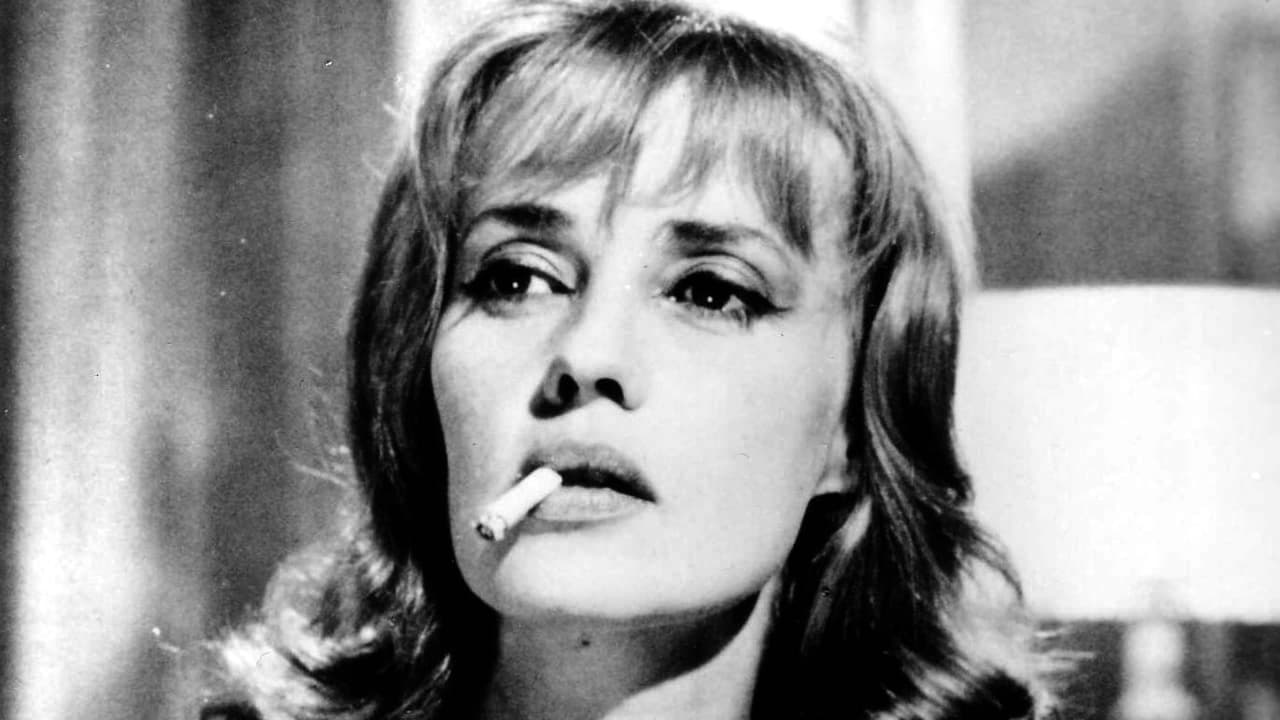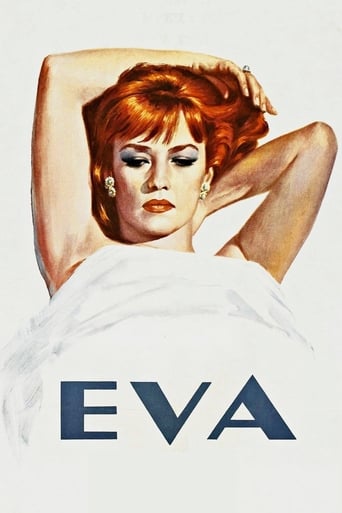

The Pseuds are gonna be falling over themselves to rave about this piece of cheese followed closely by the Academics lining up to 'teach' it. Good luck to both camps. Basically it's a pseudo-intellectual 'director' wallowing in self-indulgence, seemingly willfully - certainly knowingly - miscasting two incompatible leads and seeking in the to temper this by setting the action in an out-of-season Venice and more or less ignoring the 'tourist-picture-postcard elements in favour of a cryptic and virtually meaningless storyline involving two unsympathetic leading characters in the shape of a fraudulent novelist and - we have to take their word for this - an irresistible woman, who is, in fact, as irresistible as a three a.m. rap on the door by the Gestapo. Stanley Baker and Jeanne Moreau don't even try to do anything with this drek and it's yawns all round.
... View MoreA French Italian co-production; here we have Losey attempting to create a Felliniesque European Art House movie with hints of Nouveau Vague. Losey uses Jeanne Moreau to sell what is a concoction of 1950s and 60s art house clichés where character and story development are virtually non-existent. Nothing made me want to engage with the movie, and after an hour I just had to give up. Stanley Baker is appallingly cast as the leading man, the script is dreadfully wooden, and the unremitting jazz score does not hide the fact that this series of clichés just does not work as a film. If this is interesting only for film studies students, then maybe the people writing the courses should seriously ask themselves why - Losey made many better movies and the European Art House scene of the 50s and 60s has far better examples of ground breaking cinema. A great big pretentious yawn of a film that should have been strangled at birth.
... View MoreTwo distinctly dislike-able characters circle one another amid the nicely photographed Venice and Rome locations; unable to break away, unable to be together it seems, but wrecking the lives of those around them. It's a promising scenario, a glamorous setting, a combination of strong cast, top name director and highly rated cinematographer. One could easily imagine Antonioni at the helm with Monica Vitti and Marcello Mastroianni as the stars. But it's not them and it really doesn't work. In the male lead role Stanley Baker is well cast as an out-of-place writer from the Welsh Valleys who's made it big with one book and now lives on an Island near Venice, the new darling of the in-crowd. He's big, bluff and rugged with undeniable presence and a convincing aura of potential violence. He isn't exactly nice to know, but you get the feeling that the right woman could bring him round. Virna Lisi as his fiancée is that woman. A Beautiful, fragile, extremely desirable character, she clearly loves him despite being well aware of his many flaws. So what on earth Baker's character finds in love-rival Eva is the huge stumbling over which this whole movie falls. Disbelief can only be suspended to a degree. Eva isn't the sort of woman to bring out the best in anyone. She's clearly supposed to be some kind of irresistible sexual predator who the ex coal miner cannot resist but she's portrayed as frankly repellent. A pouting, scornful, self obsessed gold-digger who plays off lovers against pretend-husbands. She treats Baker's character with taunting disdain at every turn and yet he follows her like an eager lap-dog. Her character might, just might, have worked if an actress of spectacular sexual allure had been cast. Instead Eva is played by Jeanne Moreau. She's a fine actress but she has nothing of the Machiavellian Femme Fatale that the role absolutely demands. Take a look at the poster/DVD sleeve photo of her with cigarette dangling from a sour, down-turned mouth. It's clear this is an actress who's screen persona is more Bette Davis than Brigit Bardot - more Rachael Roberts than Julie Christie. She plays the role with conviction but cannot communicate the essential level of sex-appeal to make the story work, even when the demure camera work teases us with extended near- views of her undressing(this is an early 60s film, so explicit it's never going to be, a lot of wardrobe doors and bath taps are strategically positioned) it all just looks more sordid than sexy. It's just not her role and no amount of beautifully filmed scenes of a wintry Venice, or glamorous parties, or stylised interiors or Alfa Romeo sports cars can overcome that. There is also some poor direction of the actors - of Baker in particular, who gets a bit too over- Shakespearian in his emoting at times (early on - the hand clawing at the face...no Stan, you were better than that, much better) and a few scenes which are simply too set-up to be plausible.In the end its not a film that holds the attention, the characters are too unsympathetic to feel any connection with and although there are moments of poetry , as a whole it's a plodding misfire. My apologies to all fans of Miss Moreau - no offence, very few actresses could have made this role work.
... View More"Eva" is based on a novel by James Hadley Chase, the British writer of American "tough-guy" novels. Director Joseph Losey overlays a cryptic story of alienation and obsession, and the beautiful photography makes the life of the film seem simultaneously glamorous and lonely.But inside this modish story of a not-very-admirable man and the evil woman he falls in love with is a rollicking old noir screaming to be let out, with Robert Mitchum and Jane Greer as the femme fatale.Contemporary Hollywood-style, one-thought-at-a-time storytelling is conspicuously absent here. The audience has to work to connect the dots in this film - there's no directorial hand on the back of your neck, turning your head to look at this road sign, then that, then the other. A requirement of active audience effort was once taken for granted, but is now much more rare and may be an unfamiliar experience for some viewers.Jeanne Moreau is compulsively watchable (as always) as a woman who thinks, but we rarely know about what. The improbably handsome Stanley Baker has the time of his life acting for once, rather than punching someone's chin every twelve minutes, as in most of his films. Virna Lisi has dignity and consequence as the good girl whose love is never valued enough.The underlying story of the film is a classic fantasy of male self-justification - man chases the wrong woman, one who treats all men badly because she can. The man lets himself be led around by his privates, he thinks with the wrong part of his body, and then he blames the hash he makes of things on the "evil" woman (see Adam's explanation to God in the Garden of Eden story). Another predessor of the film is Hogarth's The Rake's Progress.Who the other characters are and what their motivations might be are minor questions - they are peripheral figures who only serve to focus the film on the central issues of male weakness and female inscrutability. The eternal question, "What do women want?", is enough to destroy the unstable male protagonist, and we watch him unravel in the beautifully photographed surroundings of Venice and Rome. The admirable letterbox transfer looks particularly seductive on a big-screen TV.If you ever wondered what a film might look like that combined "The Blue Angel," "L'Avventura" and "Out of the Past," this is about as close as you'll get. Recommended to all except the most passive viewers.
... View More